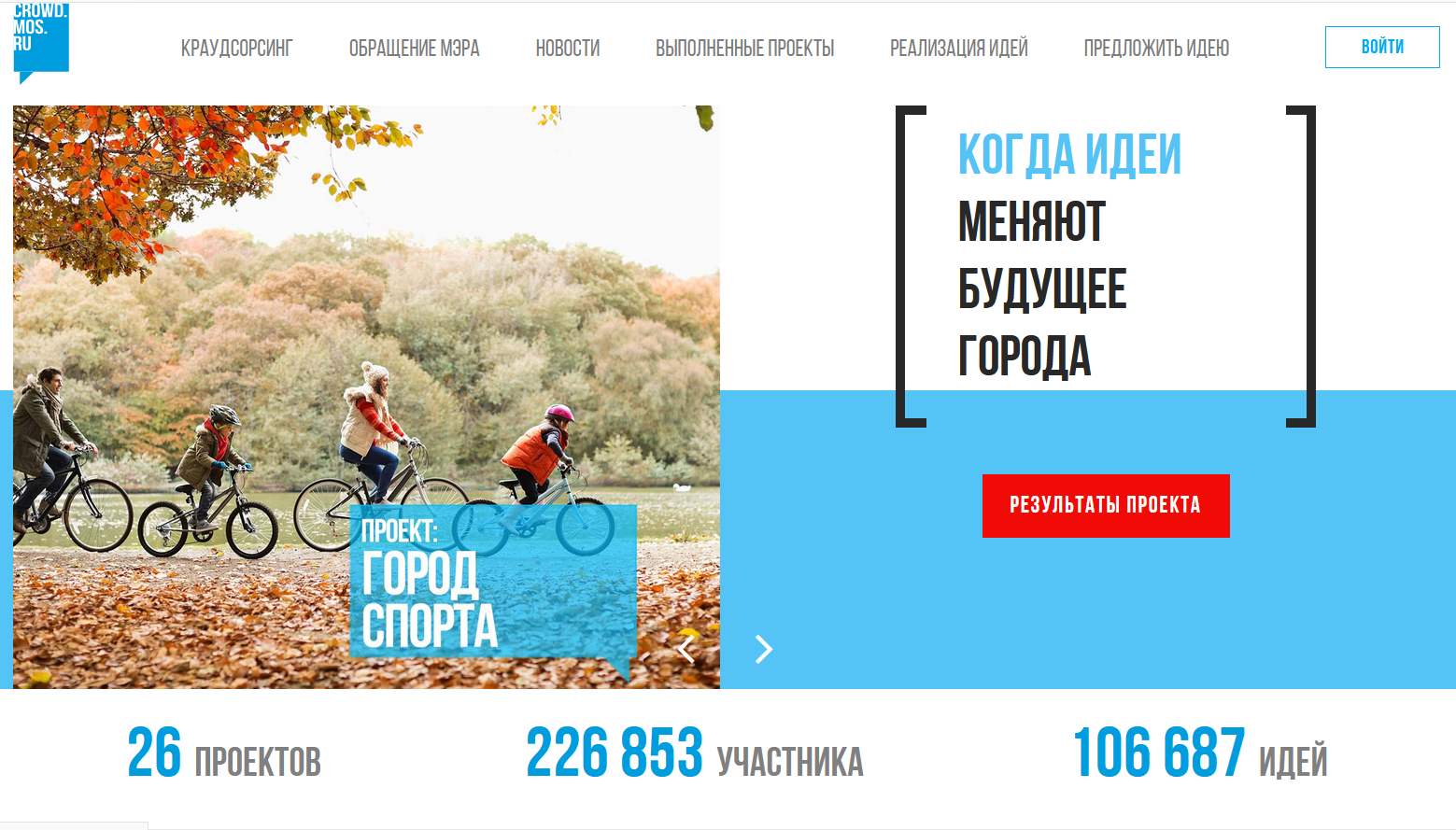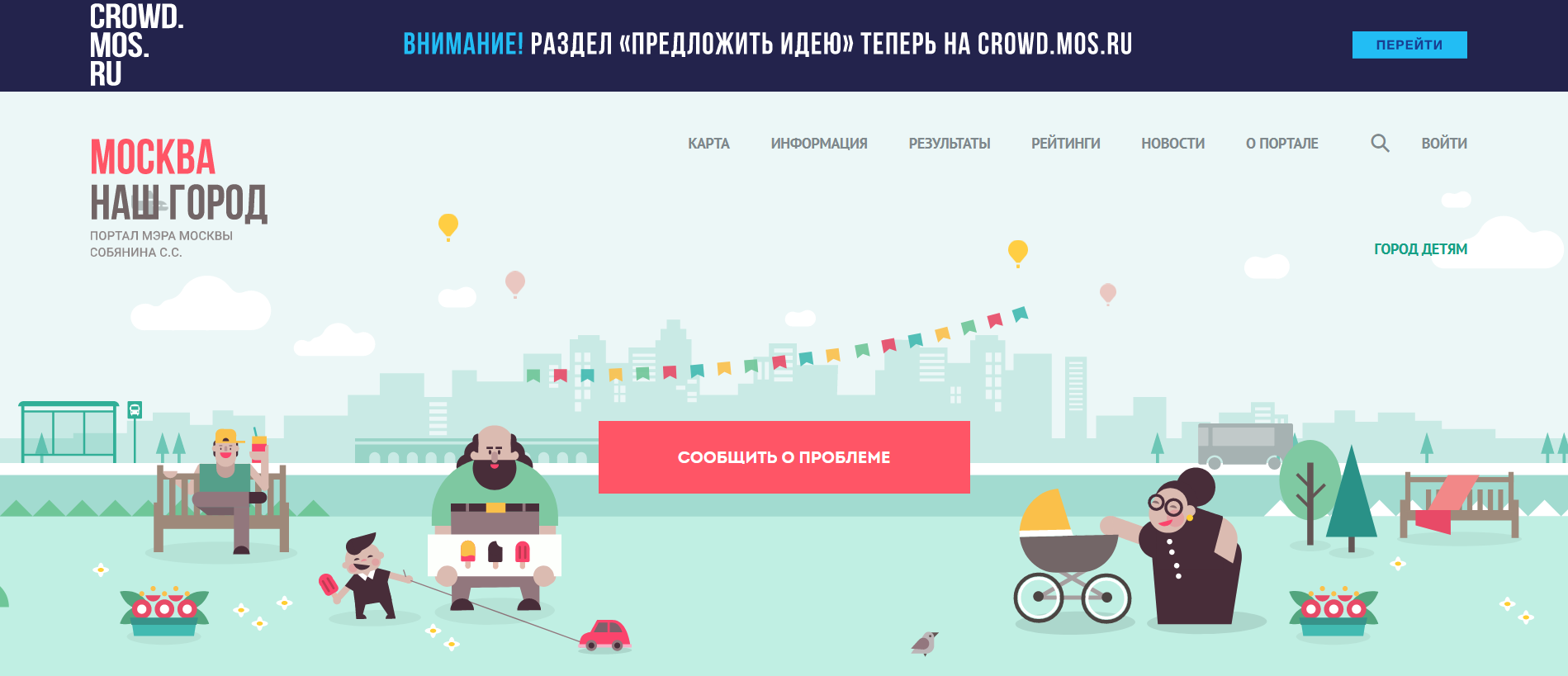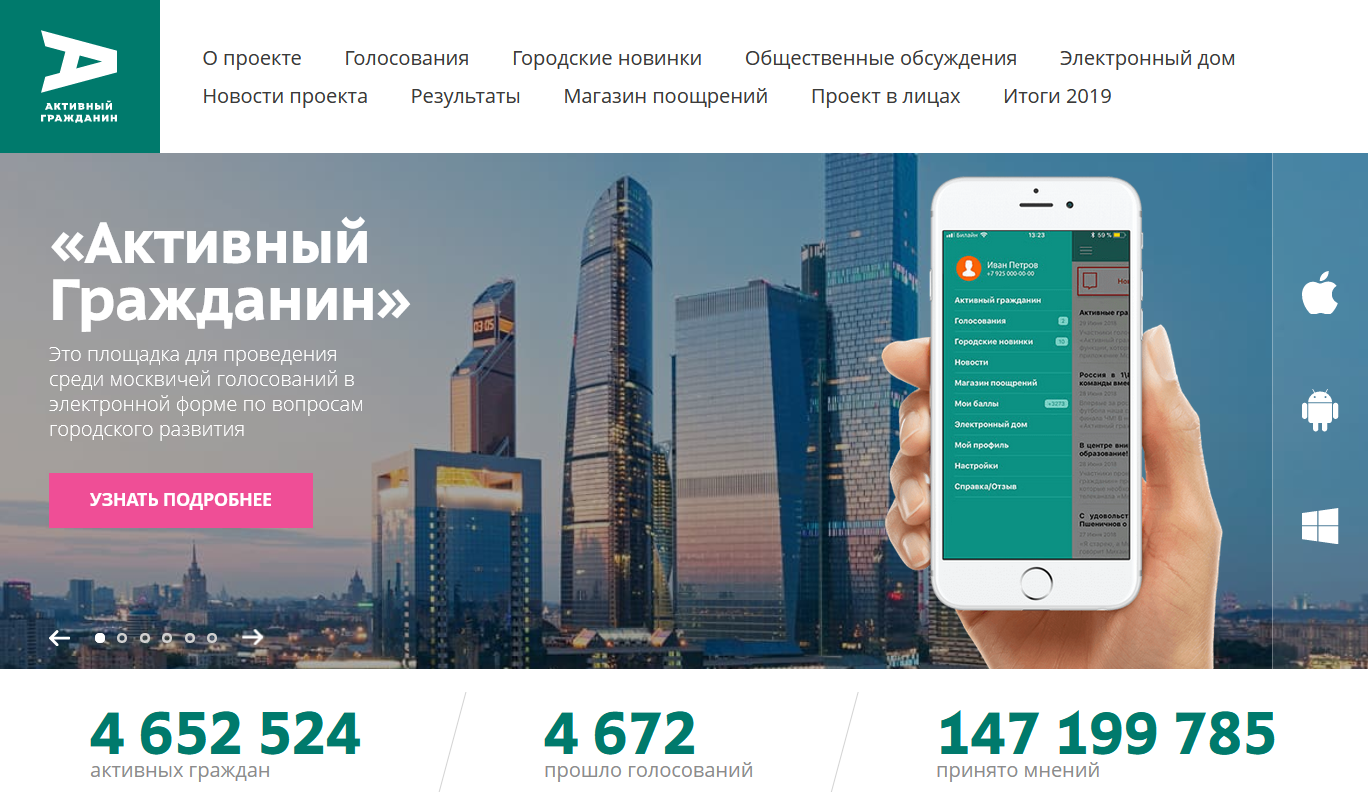- Crowdsourcing platform - crowd.mos.ru - © screenshot / City of Moscow
- Evaluation platform - gorod.mos.ru - © screenshot / City of Moscow
- Voting and implementation platform - ag.mos.ru - © screenshot / City of Moscow
City
Moscow
Main actors
City Government, Community / Citizen Group
Project area
Whole City/Administrative Region
Duration
Ongoing since 2014
A community-driven decision-making system
The “VMESTE!” system establishes a direct channel of communication between the Government of Moscow and the local population. Through a system of three distinct online platforms, citizens can interact with the city administration on a regular basis and influence the administrative decision-making process of the city. This system enables people to share their ideas, take part in online votes, and follow actions implemented by the administration. At the same time, the Government of Moscow has access to a quick feedback mechanism that can increase public participation in the development, implementation and monitoring of city programs.
Guangzhou Award
This project was shortlisted for the 'Guangzhou Award' in 2016 in the following category: Deserving Cities.
The system was developed in accordance with the “Open Government” state program of the city of Moscow, and designed for the period 2012-2018. Moreover, the “Interactive Communication of Executive Authorities of the City of Moscow with the Public of the City of Moscow” resolution of April 15, 2013, reinforced the idea of developing the “VMESTE!” system.
The objectives of the initiative are:
- to engage the maximum possible number of people in the city administration.
- to improve the quality of services delivered by the administration by combining the knowledge and experience of the local community and public officials.
- to facilitate the dialog between the local population and the local authorities.
The system addresses all aspects of living in metropolitan Moscow in order to increase the quality of life within the city.
The “VMESTE!” system gives people an opportunity to influence decisions made by the administration at all stages of policy and programme development:
- Experts from the community propose their ideas on crowd.mos.ru
- A wide audience evaluates crowd-sourced ideas and selects the best ones on ag.mos.ru
- The government implements the decisions backed by the majority of votes on ag.mos.ru
- The quality of the implementation can be monitored and evaluated on gorod.mos.ru
All of the online platforms of the “VMESTE!” system are interconnected and accessible to everyone, and they are also integrated into the work projects of the municipal government.
Funding from the city budget has been allocated for the activities of municipal services responsible for project coordination.
From the community side, the following resources have been dedicated to the project:
- Over 3,300 volunteers have participated in the project to monitor problem-solving in the gorod.mos.ru project
- Independent experts have been recruited to moderate ideas in the crowd-sourcing project crowd.mos.ru
Crowdsourcing platform - crowd.mos.ru
- 70,000 ideas have been suggested by city residents over the past two years
- More than 1,000 ideas have been put into practice
- The best ideas are included in nine city programs
Most important transformations:
- Upgrade of the healthcare sector in Moscow
- New public transportation routes
- Measures to improve the living environment of the metropolis
Voting and implementation platform - ag.mos.ru
- 1,700 referendums over the past two years
- 1.3 million participants
- 850 initiatives have been implemented
Thanks to the activity of Muscovites:
- The city is being modernized: 80 renovated streets, 300 courtyard and playground landscaping projects
- Moscow is becoming “greener”: more than 400,000 trees and shrubs have been planted
- The work standards of outpatient hospitals, schools and libraries are changing
- The sale of alcoholic energy drinks is prohibited in the city, as is the entrance of non-eco-friendly motor vehicles
Evaluation platform - gorod.mos.ru
- 800,000 users
- 1,500 issues resolved daily
Public scrutiny helps:
- To find prompt remedies to city shortcomings, such as out-of-service traffic lights, long lines, and issues concerning housing services and utility companies
- To monitor the quality of service delivered by contractors involved in public works
- To improve the quality of work of the local authorities
A series of obstacles were identified by the Government of Moscow and the following decisions have been met to overcome the challenges:
1. People’s distrust of politics and their belief that their ideas and voices are not being heard
Solutions:
- A public procedure for processing inquiries from citizens
- A system of public reports
- Engagement of independent community experts in the projects
2. Distrust in good-faith tallies in online referendums
Solutions:
- Real-time voting statistics
- Release of tally results
- Depersonalized tallies are also uploaded to data.mos.ru, an open-data portal, and made available to everyone for further research and verification
3. The popularity of the services quickly increased server loads and prompted the need for more personnel
Solutions:
- Hardware upgrades (bringing in more servers and backup systems, adding cache servers to speed up access)
- Streamlined classification of users’ online queries with automatic distribution to the relevant authorities responsible for implementing decisions
- An upper limit was introduced for the number of queries submitted per user per day
4. Disaggregated data on city infrastructure facilities
Solutions:
- Enhanced guidelines introduced for the processing and storage of data by the data processors
- Integration with the city’s open data repository on data.mos.ru
- Information updates based on input from public scrutiny
5. A risk of committing an error when assigning a specific issue to the responsible officials (city infrastructure facilities report to different municipal authorities)
Solutions:
- A system of arbitration between municipal authorities was introduced to define areas of responsibility
The following lessons were learned from the project’s implementation.
During the project’s implementation, measures were necessary to increase the availability, accessibility and convenience of the web-tools
- Mobile and web-based versions of the projects were enhanced
- A unique hi-tech platform was introduced
- A proprietary method for analyzing user activity was developed
Measures to disseminate information and to win people’s trust were introduced:
- A procedure for replying to people’s questions and enquiries
- A system of public reports
- Engagement of independent community experts in the projects
- Incentives awards for the most active voters (awarding points for taking part in online referendums, personal meetings with the city mayor)
Finally, measures have been introduced to promote the project status among officials:
- More than 200 authorities and 300 private companies have become officially involved in the project
- Personal responsibility has been given to officials for the quickness and quality of responses to citizens’ enquiries
- Development of legislative initiatives is now based on collective decisions made by the community
Guangzhou Award, Collective Decision-making System “VMESTE!” (“TOGETHER!”): http://www.guangzhouaward.org/a/760.html?lang=en
External links / documents
On Map
The Map will be displayed after accepting cookie policy


